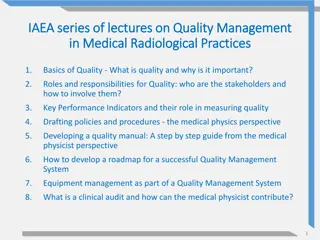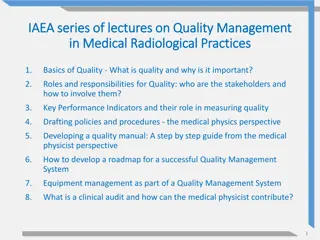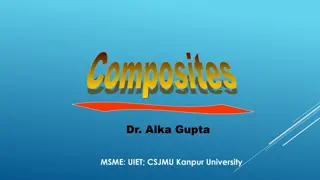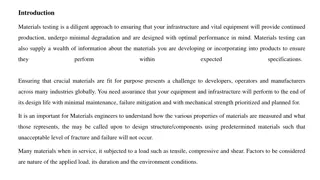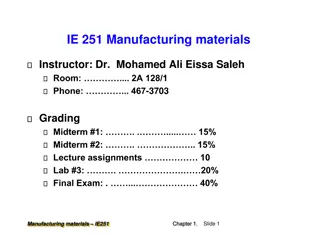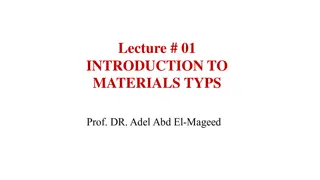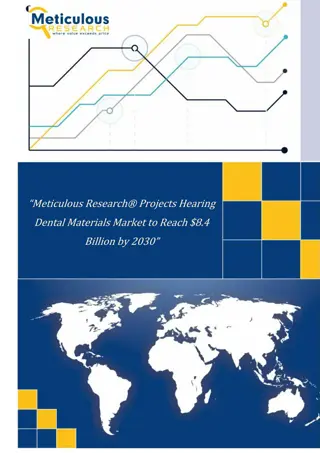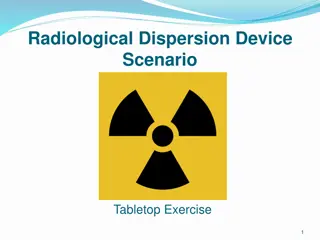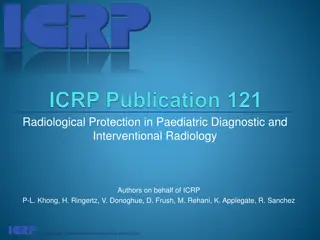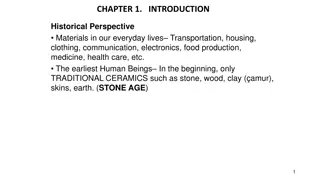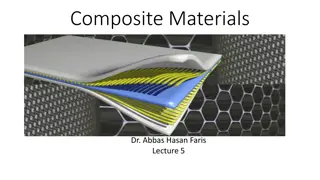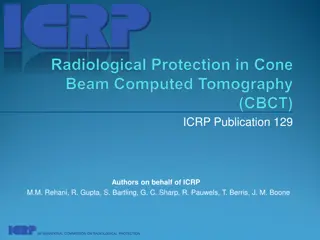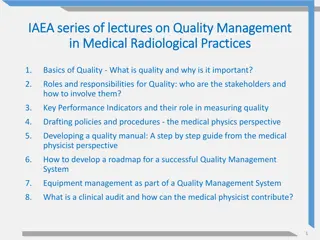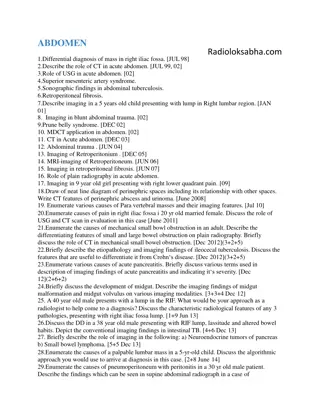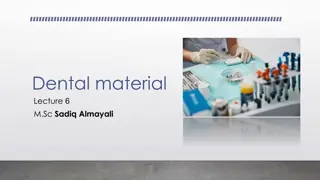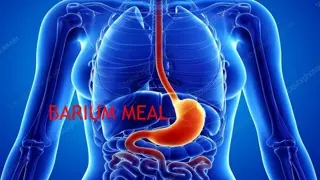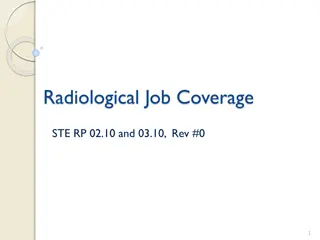Florida Statewide Assessments - Summer 2023 Overview
Training materials for the Summer 2023 Florida Statewide Assessments in Miami-Dade County Public Schools, focusing on test administration policies and procedures. The materials are based on the Spring/Summer 2023 Test Administration Manual and cover important information related to test administrati
0 views • 69 slides
Radiological Emergency Preparedness Program Assessment Guidance
This module covers the assessment policies and guidance for radiological emergency preparedness programs. It includes key concepts such as metrics for program evaluation, FEMA's assurance determination process, specific demonstration requirements, capability targets, and critical tasks. Participants
4 views • 22 slides
Module C1:Material substitution.
Explore the concept of material substitution in the context of circular economy principles for energy storage. Understand the importance of material availability, limitations of secondary raw materials in energy applications, and classification of energy conversion and supportive materials. Discover
5 views • 16 slides
IAEA series of lectures on Quality Management in Medical Radiological Practices
Quality management in medical radiological practices is crucial for ensuring the delivery of high-quality healthcare services. This series of lectures covers topics such as the basics of quality, roles and responsibilities, key performance indicators, drafting policies, developing a quality manual,
4 views • 54 slides
Comprehensive Insights into Quality Management in Medical Radiological Practices
Explore a series of lectures by the IAEA focusing on quality management in medical radiological practices, covering essential topics such as the basics of quality, key performance indicators, drafting policies, equipment management, and more. Gain a thorough understanding of KPIs, their significance
0 views • 48 slides
Comprehensive Industrial Wood Construction Education Materials for 2022
Extensive teaching materials for industrial wood construction education in 2022, prepared by various educational institutions and industry experts. The materials cover topics such as construction economy, project management, and specialized knowledge on wood construction. Students will gain insights
2 views • 32 slides
Future of Radiological and Nuclear Defense Programs and Capabilities
The Radiological and Nuclear Defense Capability Development Directorate discusses the responsibility for modernizing and procuring defense capabilities in the face of radiological and nuclear threats. The Department of Defense outlines strategic priorities to ensure the ability to survive and prevai
1 views • 10 slides
Significance of Raw Materials in Food Processing
Effective selection of raw materials is crucial for ensuring the quality of processed food products. The quality of raw materials directly impacts the final products, making it important to procure materials that align closely with processing requirements. Quality evaluation, including microbiologic
2 views • 30 slides
Understanding Dental Impression Materials and Techniques
Dental impression materials are essential in dentistry to create precise negative records of the oral tissues. The process involves obtaining a negative impression and then producing a positive reproduction using materials like dental stone. These materials must meet specific desirable properties to
1 views • 18 slides
Understanding Composite Materials: Properties and Applications
Composite materials are combinations of chemically distinct substances that offer improved properties over individual materials. They can be natural or synthetic, with examples like wood and bamboo. Composites consist of reinforcing fibers or particles embedded in a matrix material. Smart materials,
1 views • 9 slides
Understanding the Importance and Methods of Materials Testing
Ensuring materials in infrastructure and equipment meet performance standards is crucial for sustainable production. Materials testing, encompassing destructive and non-destructive methods, provides valuable insights into material properties. From tensile to compression tests, understanding stress a
4 views • 28 slides
Understanding Physical Properties of Materials in Grade 7 Natural Sciences
Exploring the physical properties of materials like strength and flexibility helps us decide which materials to use for specific purposes. Strong materials like steel and concrete are used in construction, while flexible materials like rubber and copper wire have different applications. Consideratio
1 views • 17 slides
Radiological Features and Clinical Presentations of Intestinal Obstruction
Intestinal obstruction can manifest with various clinical features such as sudden severe pain, tenderness, fever, and more. Imaging plays a crucial role in diagnosing obstruction, with X-rays showing characteristic findings in the small bowel and colon. Different types of obstructions like strangula
0 views • 43 slides
Engineering Materials and Production Techniques Overview
Learn about the various types of engineering materials used in high-performance manufacturing, including natural and synthetic materials. Explore the properties of materials, such as strength, conductivity, and resistance. Discover the different categories of metals, alloys, and polymers commonly ut
0 views • 19 slides
Materials Science: Revolutionizing Innovation in the Next Decade
Materials science is poised to be the cornerstone of technological advancements in the next decade, addressing challenges such as clean energy, product innovation, and material supply disruptions. Scientists are leveraging advanced simulation techniques and machine learning to accelerate materials r
2 views • 15 slides
IE 251 Manufacturing Materials Course Overview
Explore the impact of modern materials on daily products, understand engineering materials and their properties, and delve into classes of materials like metals, polymers, ceramics, and composites. The course covers topics ranging from atomic structure to phase transformations, emphasizing the role
0 views • 14 slides
Understanding Materials Science and Engineering Fundamentals
Materials play a crucial role in our daily lives, influencing everything from transportation to communication. This lecture delves into the historical significance of materials, the distinctions between materials science and materials engineering, and the importance of structure-property correlation
1 views • 25 slides
Exploring Materials in Everyday Objects
Discover the suitability of different materials for specific uses through fun activities like a spoon race with various spoon materials. Explore why certain materials are not appropriate for certain objects and engage in creative tasks like imagining a spoon made of tissue paper. Michael Rosen's whi
0 views • 6 slides
Dental Materials Market
The dental materials market is categorized based on type\u2014comprising Indirect Restorative Materials (metal-ceramics, ceramics, and other indirect materials), Direct Restorative Materials (amalgam, resin-based composites, glass ionomer, and other
0 views • 4 slides
Radiological Dispersion Device Tabletop Exercise Overview
This tabletop exercise focuses on simulating a radiological dispersion device scenario to enhance emergency response readiness and assess response plans. The exercise includes agenda discussions, administrative details review, scenario analysis, facilitated discussions, action planning sessions, and
0 views • 32 slides
Radiological Protection in Paediatric Diagnostic and Interventional Radiology
Radiological protection in paediatric diagnostic and interventional radiology is crucial due to the higher risk per unit of radiation dose for infants and children compared to adults. The justification for using radiological examinations should prioritize patient benefits, with emphasis on optimizat
0 views • 36 slides
Understanding Raw Materials in Ceramic Production
Raw materials play a crucial role in ceramic production, with three main groups identified - plastic materials like clay, non-plastic or leading mixtures such as silica, and fluxes/mineralizers like feldspar. These materials undergo various transformations during the manufacturing process, contribut
0 views • 29 slides
Understanding X-Ray Diffraction Techniques in Materials Science
X-ray diffraction (XRD) analysis is a crucial technique in materials science for determining the crystallographic structure of materials. By irradiating a material with X-rays and measuring their intensities and scattering angles, XRD helps identify materials based on diffraction patterns. This meth
0 views • 5 slides
Nuclear Security Culture and Managerial Role: Insights from IAEA Conference
Exploring the concept of security culture in nuclear facilities, this presentation by Carsten Speicher at the IAEA International Conference on Nuclear Security delves into the role of managers in fostering a positive security culture. It discusses the risks posed by radiological terrorists and the p
0 views • 16 slides
Efficient Materials Management Strategies for Optimal Operations
Efficient materials management aims to ensure the right materials are available at the right place, time, quantity, and quality. It involves stages such as precise objective definition, specification of requirements, and measurement of performance. Factors influencing materials management include te
0 views • 20 slides
Understanding Types of Language Teaching Materials
Explore the various types of language teaching materials, including authentic and non-authentic materials, pedagogical resources, and created materials. Learn about the characteristics of authentic material and its advantages in language learning. Discover examples of authentic materials such as son
0 views • 22 slides
Evolution of Materials Science and Engineering in Human History
Explore the journey of materials in human history, from traditional ceramics to high-tech metal industry and beyond. Learn about the development of materials science and engineering, the different properties of materials, and the classification of materials into metals, ceramics, polymers, composite
0 views • 9 slides
Understanding Composite Matrix Materials in Engineering
Composite materials are made of reinforcing fibers and matrix materials, with the matrix serving to protect and enhance the properties of the composite. There are three main types of composite matrix materials: metal matrix composites (MMC), ceramic matrix composites (CMC), and polymer matrix compos
0 views • 22 slides
Understanding Radiation Safety in Cone Beam CT Imaging
Cone Beam CT (CBCT) technology has revolutionized imaging in various medical fields, presenting unique radiological protection challenges. This summary highlights the importance of optimizing radiological protection for patients and workers using CBCT, emphasizing the need for informed decision-maki
0 views • 24 slides
Understanding the Classification of Magnetic Materials
The origin of magnetism lies in the orbital and spin motions of electrons, determining the magnetic properties of different materials. All matter is magnetic to some extent, with substances exhibiting diamagnetism, paramagnetism, or ferromagnetism. Diamagnetic materials oppose applied magnetic field
0 views • 24 slides
Effective Equipment Management in Medical Radiological Practices
This presentation focuses on key aspects of managing medical equipment within a Quality Management System in radiological practices. It covers topics such as the importance of quality, roles and responsibilities, equipment procurement procedures, and developing a successful Equipment Management Syst
0 views • 32 slides
Comprehensive Radiological Imaging Review in Abdominal and Adrenal Pathologies
This extensive radiological imaging review covers a wide range of topics in abdominal and adrenal pathologies, discussing differential diagnoses, imaging modalities such as CT and USG, specific syndromes like prune belly syndrome, and conditions like retroperitoneal fibrosis. It delves into various
0 views • 39 slides
Vulnerability of Radiological Materials to Theft by Terrorist Groups in US Civilian Entities
The vulnerability of radiological materials stored at US civilian entities to theft by terrorist groups, particularly low-activity sources, remains a significant concern. Security measures primarily focus on high-activity sources, leaving lower activity sources neglected and highly susceptible to ex
0 views • 16 slides
United States-Japan Joint Study on Material Attractiveness
This collaborative study between the United States and Japan aims to evaluate and reduce the risks associated with nuclear materials and facilities being targeted for malicious acts. The focus is on assessing the attractiveness of nuclear materials for theft and misuse, as well as susceptibility of
0 views • 10 slides
Workshop on Ethical Dimensions of Radiological Protection System
This workshop focuses on exploring the ethical values within the radiological protection system, addressing practical implementation aspects that raise ethical questions. It aims to improve understanding, communication, and management of radiation risk, building on previous workshops' outcomes. The
0 views • 10 slides
Understanding Rheology in Dental Materials
Rheology is a crucial aspect in dentistry as it deals with the flow properties of various dental materials, including liquids like molten alloy and impression materials. Viscosity plays a key role, determining how materials flow and behave. Different fluid classifications based on rheology, such as
0 views • 15 slides
Indoor Chemical and Radiological Risk Monitoring Study
The (IN.SITU) Chemical and Radiological Risk in the Indoor Environment (CHeRRIE) study conducted measurements of radon concentrations and e-perm levels in indoor environments from Oct. 2014 to March 2015. The findings show variations in radon and e-perm levels at different times of the day and acros
0 views • 14 slides
Understanding Barium Meal Radiological Study
Barium meal is a radiological study of the upper gastrointestinal tract, including the esophagus, stomach, duodenum, and proximal jejunum. It helps diagnose various conditions such as peptic ulcers, cancers, and gastrointestinal obstructions. The procedure involves oral administration of barium cont
0 views • 11 slides
Radiological Job Coverage and Operating Experience Review
Explore the importance of proper job coverage in radiological tasks, focusing on a specific incident involving workers entering the wrong location inside a high radiation area. Learn valuable lessons on following procedures, training, and maintaining continuous job coverage to ensure safety. Underst
0 views • 139 slides
Understanding Insulating Materials for Energy Efficient Buildings
Insulating materials play a crucial role in maintaining energy efficiency in buildings. This presentation covers the classification of insulating materials based on solid structure nature - mineral, vegetal, and synthetic. It explores the properties and applications of different types of insulating
0 views • 41 slides



